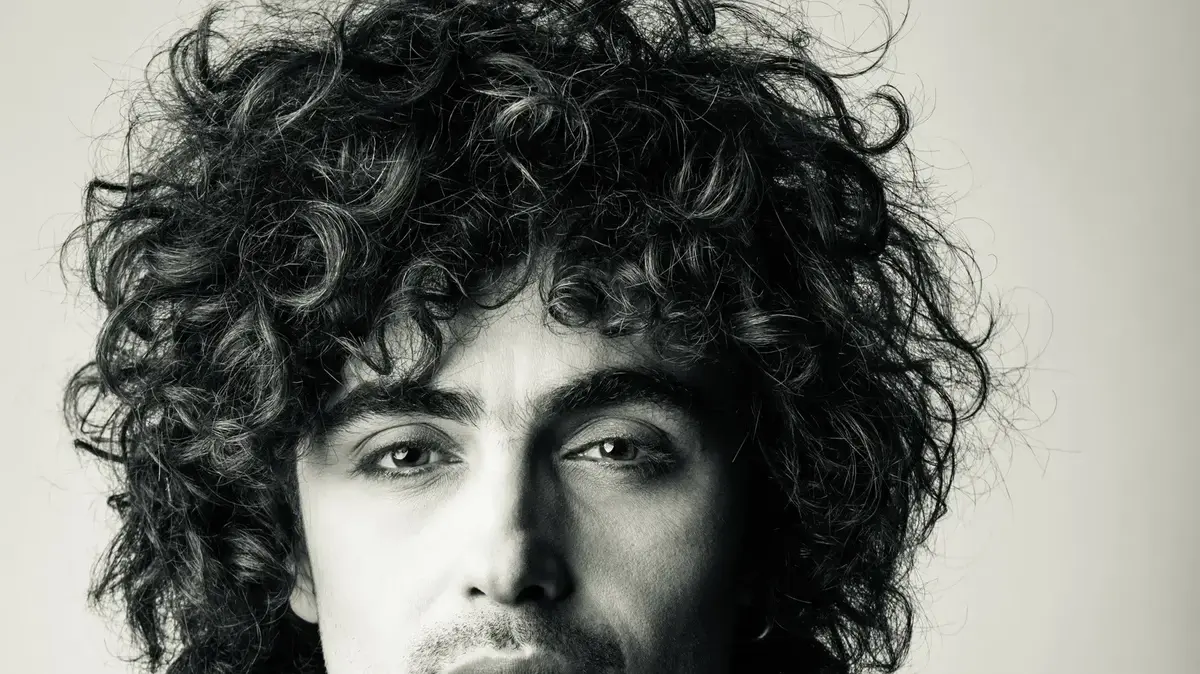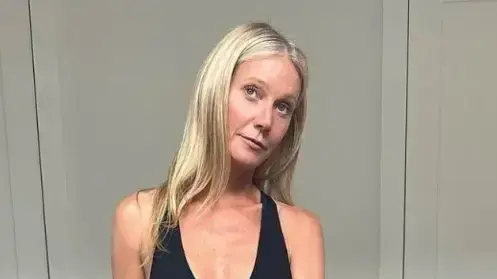The moment that musician Mark Eliyahu loves the most is when a show starts.
"There is a moment of great tension before I go on stage, where I am still tied to time and earthly place. Then I go on stage, and in one moment I connect to something that is temporary, beyond time. This transition is boom. It's like a bridge that opens, and boom, you enter To the height of presence and rightness. This transition is one of the moments that most excites him and is my favorite."
Musician, composer and music producer Mark Eliyahu is a very busy man.
He is free to speak with us just after he finishes a performance in the city of Sarajevo, which opened the city's jazz festival and all the tickets for which were sold in advance.
He was born in the Caucasus Mountains 40 years ago to a family of musicians.
His father, Peretz Eliyahu, is a musicologist, tar player and prominent composer who won the Prime Minister's Award in 2008. At the age of four, Mark started playing the violin.
At the age of 16, he went to Greece to study playing Beglama, as well as Greek and Turkish music with the Irish musician Ross Daly.
After he discovered the kamancha (Persian bowed instrument) and fell in love with its sounds, he went to Azerbaijan for two years of studying the instrument and Persian-Azeri music with the master Adlet Vazirov.
In 1999 he returned to his family in Israel and started a solo career.
He first appeared alongside his father.
A year later he founded his own ensemble, the Mark Eliyahu Ensemble.
Since then, for more than 20 years, there have been many performances all over the world.
Mark Eliyahu (Photo: Zohar Ron)
Eliyahu released four acclaimed studio albums and became one of the most played Israeli musicians on Spotify and with tens of millions of views on YouTube.
He played with some of the greatest artists in Israel, composed works for dance, film and television - and picked up a number of awards, including the Akum Award for Composer, the Ofir Award (for the soundtrack to Bnei Torti's "Ballad of the Crying Spring") and the Television Academy Award (for the soundtrack to the successful series "Tehran" of here 11).
On November 24, Eliyahu will return to the concert to perform at the Culture Hall in Tel Aviv, as part of the concert tour following his fourth album that he released in March of this year, "About love".
In the show, he and his band combine instruments from the ancient world such as kamancha, tar and galama with a modern and cool production, in what is described as a "tribal party".
His father Peretz Eliyahu will take the stage with him.
"We go around and perform all over the world, but performing at home is the most exciting. A home is a home," he says.
"I will host my father and also my mother, who is a pianist, on stage. So the concert is very homey, and it will also include new music that was born on the road. The last concert at the Culture Hall was really crazy and we are really looking forward to this concert. It is really the cherry on top of the tour." .
From your childhood until today you live in wanderings.
What are the advantages and disadvantages of this way of life?
"For as long as I can remember, we have been nomads. As children, my parents wandered from place to place, as a family we moved through many cities and countries. When I was a 16-year-old teenager, I left Israel, home. I composed music for a dance troupe in the Netherlands, then in Portugal, then I worked in Portugal, and then I composed music for a project of Philharmonic in Italy. I went on, built a band and released an album. So ever since I can remember I've been on the road. The roads have always brought me a lot of inspiration. I composed all the pieces on the road, in hotels, on trips, in meetings with people who brought a lot of inspiration, with all kinds of musical instruments and types of music Different. Wandering and changing is my nature."
More in Walla!
David Baroza: "To this day in a performance in front of religious people I blur out the vulgar word"
To the full article
"The roads give a lot of inspiration, but the privilege of sitting in one place is the opportunity to go deeper within yourself. On the road it is very difficult to go through mental, spiritual and mental processes as well as physical ones that have a rhythm. For example, if you want to practice yoga, it is difficult on the road when you do not sleep day after day, for full months , it's hard to maintain training and get things into a rhythm. A big minus of the roads is the longing for family and home during the times I'm gone. My stunning and incredible wife supports me. I have three children and it's not easy for dad to travel a lot."
Did you sometimes take the children to concerts and hide them behind musical instruments on stage?
"The children and the family are very involved in the works and this thing and sometimes also come to the concerts. But when there are busy tours it is very difficult and very intense so it is less suitable."
You follow in the footsteps of your musician father.
Are your children showing musical tendencies?
If they become footballers, will this be their ultimate rebellion?
laughing
"I don't have any expectation that my children will go into a certain profession. I wish them to connect with what they are really supposed to do and wake up every day happy. My parents did not want me to be a musician. They wanted me to choose a more organized profession because a musician is a profession with a lot of sacrifice and a lot of lack Sure, and there are also difficult things about it. They didn't want me to be a musician, but from my childhood, music had a great influence on me. Ever since I can remember, I've been playing, singing, writing songs and dancing. I was always with music. At some point, my parents realized that every moment I wasn't in music, I was doing A mess, so they realized that this was my path. At the age of 16, I asked to leave home, and study music abroad with a master I really liked, and they supported me and invested in me and believed in me, which is the most important thing.
They allowed me to get out of the system, from school and graduation.
This is also what I expect myself to do with my children, to support what they like to do.
All three are related to music.
The eldest, 15 years old,
Learns guitar and from a small age plays instruments and studied with my father Tar and he is also a DJ.
My middle one, 12 years old, is learning piano, really likes it and also writes some tunes.
And my little one is 6 years old, and she flies on all the instruments and writes melodies on the piano.
So all three are in music.
And I think that music, even before a profession, is first of all a great gift to a human being, both to the listener and to the one who plays, it's a gift."
Mark Eliyahu (Photo: Gabriel Beharlia)
One of the most distinguished stops on Eliyahu's path was the creation of the music for the successful TV series "Tehran" of Khan 11, for which he was awarded the Television Academy Award.
"From the first moment I saw the script, when I was approached to write the music, something grabbed me and I couldn't stop reading it until the wee hours of the night. I connected to the story, the cultural meeting and the message about how similar we are. It gave me the opportunity to give expression to the electronic music I made At home and I never went outside. It was really, really fun. I'm approached by series from around the world, from big productions, so that I can write music for them. 'Tehran' came to me at the beginning of the Corona virus, and I had the opportunity to sit down and do it. Today I don't have the opportunity to sit down in the studio For weeks or months of and create music for series and movies because I'm constantly on the road. But we sell rights to use my existing works mainly to successful Turkish series."
Speaking of Tehran, it turns out that Eliyahu has quite a few fans in Iran as well who flood his social networks.
Recently, he said, he received quite a few messages from Iranians sharing him in the hijab protest events.
"Since the beginning of the protest, my Instagram has been bombarded with messages and comments about what is happening there. A great thing is happening there. I hope that the Iranian people will really be able to free themselves from the oppressive regime they have. I do not understand politics and do not know what the chances are that the regime will collapse. But I think that the Iranian people deserve to be free and I wish They have it wholeheartedly."
You must be dreaming of performing in Iran.
"This is one of my biggest dreams. I hope that one day I will be able to perform there, I will play for them in Iran and celebrate their magnificent culture, which has such ancient and deep roots, and combines the Far East with the Middle East. It is a culture that has brought me a lot of inspiration."
More in Walla!
It's already clear: this is one of the most radical seasons of "Wonderful Country"
To the full article
Mark Eliyahu (Photo: Gabriel Beharlia)
President Herzog said this week that "the whole world is anxious" MP Itamar Ben Gabir. As someone who appears a lot in the world, do you share the feeling and fear that following the government that is expected to rise more artists will boycott Israel and BDS will grow stronger?
"We went through and are going through all kinds of crises. I don't really know about Ben Gvir and what is really going on. It's really sad that there are things like the BDS, for example when I came to Paris we were supposed to have a show in one of the big parks. The BDS activists announced the day before that they were going to demonstrate , and in the 90th minute we moved the show to a closed complex in Paris. At the end of the show, after we got off the stage, hundreds of protesters were waiting for us, shouting with signs and fabricated pictures and being aggressive. It was really unpleasant. You come from a being of love, music and connection into one that is The absolute anti of what you do and the message you convey. It's very sad when it comes to these places. I think music can be a kind of medicine or something that will bring connection and not separation. I pray that no more war will break out and that we live in peace. War is the greatest harm that can To be, more than Corona and everything. War ends the important things we have, including culture. I hope the government will not lead to this."
Eliyahu worked with quite a few leading Israeli artists including Rita, Dodo Tessa, Berry Sakharof, Idan Reichel, Omer Adam, Yuval Dayan, Yishai Rivo and his sons Barbie.
When I ask him with which artists he had a particularly strong connection, he replies: "I had a very special connection with Shai Sabri. Shai is a dear person and an artist who influenced me in terms of his simplicity, and the way he brings joy with emotion and folk in a place of art and precision. We We've been collaborating over the years, he's a guest at my shows, and I really like him and am connected to him."
"I also got on very well with his uncle Tessa. We met in the movie 'The Ballad of the Weeping Spring', for which I wrote the music and we both also acted in it. Since then, a very special connection has been formed, and we are guests at each other's concerts and collaborate. I really like the fact that he brings very ancient roots, He is connected to his grandfather and his family, who were among the greatest musicians in Iraq, and he brings the roots into new, groundbreaking, Hebrew, Israeli music. I really appreciate his path."
Tell me about working with Rita.
"She is one of the artists from whom I learned a lot, in terms of how to behave on stage. She is a diva, but she has not lost the simplicity, the sincerity and the huge love she has, both one-on-one and in front of the general audience. We rehearsed, she would cook, bring pots of Persian food , I learned a lot from her to remain a simple person and also the precision and perfection she has on stage. And of course her singing and performance. She has her own stamp and color. Rita is Rita, and unlike anything else."
Did the fact that you are one of the most played Israeli artists on Spotify, and also receive many views on YouTube, lead to an adequate salary from the digital platforms?
"I released my first album at a time when only CDs were released, there was no streaming yet and no digital files distributed in this way. There are many pluses in not being dependent on the record company, and my exposure depends on my art and me and not on other factors. If I can make a living from it? I feel rewarded by streaming It's very fun to see how much people listen to me, and yes, you can make a living from it."
More in Walla!
There is no one like him: Rami Kleinstein celebrated 60 in a performance that proved his place in the local pantheon
To the full article
Mark Eliyahu (photo: Carlos Yanez)
Eliyahu's song that received the most views on YouTube is "Journey" (almost 50 million views).
He previously said in an interview with News 13 that he wrote this piece out of "supreme happiness mixed with severe sadness".
Now he explains what he meant: "The anxiety that all this goodness that exists and all the supreme and infinite happiness and all the physical things we have to hold on to will disappear - all of these can end. The combination of the feeling of eternity, which is really supreme happiness, and the longing I always feel. I always feel longing and longing For something. You can't put it into words. It's not a specific and concrete experience. It's some kind of emotion that I live and experience and it makes my throat choke, and the music is a medicine or the sweetener of the feeling."
Along with the huge success in concerts in Israel and around the world, in streaming and recordings, strangely not a single instrumental piece that you created and performed in your albums was included in the Galgalatz playlist.
Does it bother you that Israeli radio plays so little instrumental music?
"In the world, there has been a lot of openness to instrumental music, and my music is played on mainstream radio stations in other countries. So far, none of my instrumental pieces have entered the Galgaltz playlist, but I think Israel is on its way there because the musical editors change over the years and they promote this openness and understand the need and love of the people For instrumental music, without words. I think there is more openness over the years."
More in Walla!
Legendary Brazilian singer Gal Costa has died at the age of 77
To the full article
Mark Eliyahu in concert at Zappa Amphi Shoni (Photo: Regev Gal)
You are a very talented and successful player, composer and producer.
Would you be interested in succeeding as a singer in the media mainstream as well, let's say as Avishai Cohen did?
"I sometimes sing live, but I don't have any studio performance or recording that I sing. At a very young age, I loved to sing. I sang at extended family events. I also sang in a synagogue, as someone from a traditional home. Singing was always there. At some point, when I first heard the kamantz 'E, which I am playing today, I felt that this is what I want to do, that there is some sound that plays inside that brings a very deep expression without words. An emotion and a message that cannot be expressed in words. And sounds make it possible. Both musical instruments and music without words at all make it possible For me to express places that words can't express. That's why I play more, and when I sing it's voices without words. Words make the work less abstract."
You hold a lot of full concerts in the world in significant places, conquer the top of the streams in streaming, win awards, you have collaborated with the greatest musicians in Israel and you are greatly appreciated.
But if we ask people on the street - most of them won't know your name.
How do you explain the gap?
Does it bother you that you didn't become famous in Israel?
"I don't have a pursuit to reach the mainstream or become a celebrity or anything like that. I feel like I want to always stay in this simple place. Music is love, and I'm a servant of love, wanting to connect people to their hearts from a pure place and not from a place of ego, so I'm not in that pursuit. I'm interviewed, like now, but I don't pursue it. I feel that I do get feedback from the world. Most of my sold-out performances, also in front of 10 thousand people in Turkey, also my first performance in Sarajevo, on a stage in front of 1,500 people from which I just got off, was Sold out. When I'm at concerts in Turkey, Germany and other places, a lot of people come up to me and give me love. It's very exciting and of course rewarding. People come up to me in the streets and airports and ask to take a picture with me. So my exposure at the point I'm at is the size I can still contain it, it's Fun and exciting. I don't wish for more than that, in terms of preserving private life."
culture
music
Israeli music
Tags
Mark Eliyahu





/cloudfront-eu-central-1.images.arcpublishing.com/prisa/FGQS6IDNB5EX5EXV5SLJ3ZATFY.jpg)



